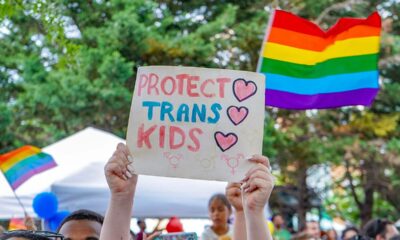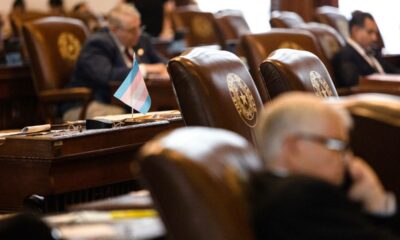Texas
As Texas targets trans kids, their families scramble to find lawyers
Ever since Gov. Greg Abbott directed the state’s child welfare agency to investigate parents who provide gender-affirming care to their children, LGBTQ-affirming family lawyers statewide have been deluged with calls.

This article originally appeared in The Texas Tribune
 For the last two weeks, a mom in the Austin area has been vacillating between rage and panic. Some days, she’s so fired up she feels like she could take on the entire state of Texas by herself. Other days, she just crawls under her weighted blanket and lets the fear take over.
For the last two weeks, a mom in the Austin area has been vacillating between rage and panic. Some days, she’s so fired up she feels like she could take on the entire state of Texas by herself. Other days, she just crawls under her weighted blanket and lets the fear take over.
The woman, who asked not to be identified to protect her family, has an 8-year-old transgender daughter. In late February, Gov. Greg Abbott directed the state’s child welfare agency to open child abuse investigations into parents that provide gender-affirming care to their children.
This family hasn’t had a visit from Child Protective Services, but they know others who have and they’ve started preparing for the possibility that they could be next.
They’re trying to figure out how to explain all this to their daughter, who they’ve tried their best to keep insulated from the growing anti-trans backlash.
“Sadly, that’s going to change,” she said. “We’re going to have to have a conversation with her about somebody potentially coming to her school and trying to talk to her.”
Even though they have no reason to believe that they’re going to be investigated, the family has started speaking with a lawyer who specializes in LGBTQ family law.
“It would put my mind at ease to know that I have a human being I can call, a sort of a helpline if somebody shows up at my door, somebody that already knows my family,” she said.
This mom isn’t alone. The Texas Tribune talked to seven families with transgender children who have proactively hired lawyers as a result of this directive. None were willing to give their names, fearing that someone might report them if their identity became known.
And lawyers who specialize in LGBTQ family law say the number of families reaching out in fear of potential child abuse investigations is unlike anything they’ve ever seen.
Last week, Ian Pittman’s phone started ringing. And it hasn’t stopped since. Pittman is based in Austin and, as a family lawyer specializing in LGBTQ issues, works in a growing and underserved sector.
“But I have never gotten this many phone calls or requests for consultations,” he said. “The number of people who have called has exponentially increased … and the common thread is that everybody feels terrorized.”
This latest wave of fear among parents of trans kids started two weeks ago, when Texas Attorney General Ken Paxton issued a legally nonbinding opinion equating certain gender-affirming medical treatments for transgender children with child abuse. Abbott followed up with a letter directing the state’s child welfare agency to open investigations into “any reported instances of these abusive procedures.”
Most gender-affirming care focuses on “social transition” — allowing a child to express their gender however they see fit. Some transgender children take puberty blockers, a completely reversible medical treatment that’s prescribed for a wide range of situations beyond transition. Paxton and Abbott also cited concerns over gender-affirming surgeries that are rarely, if ever, used on children.
In a court hearing Wednesday, a lawyer for the state argued that the directive is not intended to mean that the use of puberty blockers or gender-affirming surgery is always abuse, rather that it could be used in an abusive manner.
But anyone can make a report of child abuse, anonymously, and the state has to investigate, meaning parents could face an investigation for any number of reasons.
Pittman is representing two clients who are currently facing investigation by Child Protective Services. Though the reports are anonymous, he said he has reason to believe at least one of the allegations was politically motivated.
The family’s address on the report was one they haven’t lived at for years, ever since it was released publicly as part of a doxxing campaign against trans activists.
Pittman and other lawyers say they’ve also been deluged with calls from families who haven’t yet been contacted by CPS but want to be prepared. He said one family was preparing to start their child on puberty blockers and wanted his opinion on whether they should wait.
“I’ve never before had to consult parents of children about whether or not they should follow doctor’s orders,” the attorney said. “The fact that they think that they need to get a legal opinion about whether to follow medical advice is mind-boggling.”
Many lawyers and advocates are hopeful that this directive will be struck down by the courts. A state judge on Wednesday intervened to stop an ongoing investigation into the parents of a 16-year-old transgender teenager and scheduled a hearing for next week to consider a statewide injunction.
Paxton filed an appeal Thursday, so rather than having that hearing next week as planned, there is a temporary hold on the injunction hearing until the higher court rules.
And while that all gets sorted out, there are at least two other ongoing investigations — and the real number may be much higher. A spokesperson for the Texas Department of Family and Protective Services did not respond to a request for comment on the number of reports the agency has received and the number of ongoing investigations.
DebnamRust, a Dallas law firm that specializes in LGBTQ family law, is currently working with five families, some of whom are currently under investigation by CPS. Attorney Derek Mergele-Rust said these families are not willing to just wait for the courts to sort this out while their lives hang in the balance.
“There is a palpable fear from parents who are afraid their kids are going to be taken away from them and they’re going to be labeled as child abusers,” said Mergele-Rust. “If you’re labeled as a child abuser and you are a licensed professional in the state of Texas, you can’t do your job anymore … there are far-reaching consequences on parents’ lives, too.”
Mergele-Rust and other lawyers interviewed for this story stressed the importance of starting to build a relationship with an experienced family law attorney now, even if CPS hasn’t gotten involved yet.
“You need a plan,” he said. “A lot of parents are being encouraged to gather documents from doctors and the schools stating that the children are fine and they’re following doctor’s care, things of that nature.”
Families may also need more than one LGBTQ-affirming family lawyer on speed dial. As is typical in child abuse cases, the children need a different lawyer than the parents; ideally, in these cases, they want those lawyers in person during the interviews.
There is some light on the horizon for these families: In just the past week, Lambda Legal and the National Center for Lesbian Rights have heard from hundreds of child welfare lawyers statewide who are stepping up to provide pro bono or low-cost representation to these families.
NCLR legal director Shannon Minter, a trans man who lives in East Texas, said that support has been inspiring to see — and horrifying that it’s necessary.
“This is the worst thing I’ve ever seen happen … to LGBTQ people in my 30 years of practicing in this area of law,” Minter said. “It’s such a blatant fiction to try to say that supporting a transgender kid is abuse.”
Minter encouraged families to call Lambda Legal or the NCLR to get in touch with a lawyer sooner rather than later.
“Once you’re in the clutch of the child welfare system, you’re very vulnerable,” he said. “You don’t want to have to, at that point, be wasting time and energy looking for a lawyer after you’re already targeted.”
Reporter Sneha Dey contributed to this story.
The Texas Tribune is a nonpartisan, nonprofit media organization that informs Texans — and engages with them – about public policy, politics, government and statewide issues.
Education
Feds investigate another Texas school district for its gender identity mandate
Katy ISD’s board voted this past fall to require staff to notify parents if their child wants to use a different pronoun or identifies as a different gender.
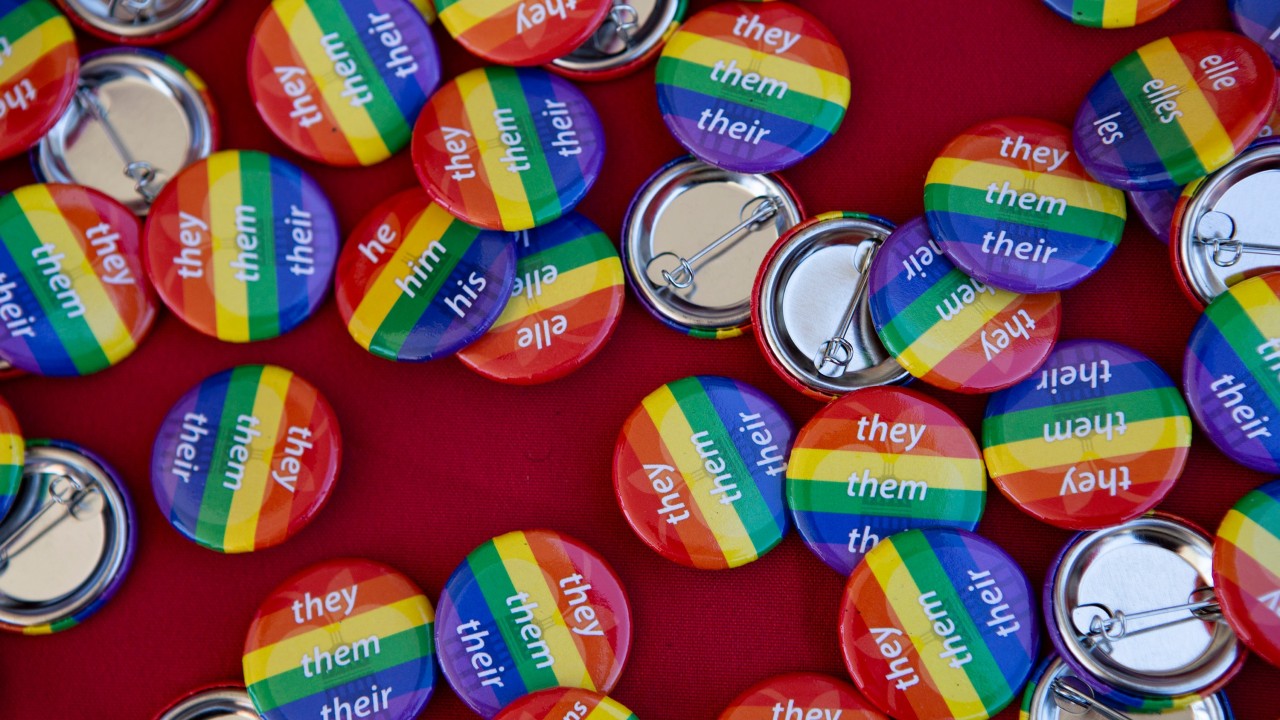
This article originally appeared in The Texas Tribune
 The U.S. Department of Education’s Office for Civil Rights opened an investigation Monday into Katy Independent School District’s gender identity policy on the basis of gender harassment under Title IX. The investigation came nine months after the Houston Landing reported that the district adopted a policy that notifies parents if their child requests to use a different name or pronouns at school.
The U.S. Department of Education’s Office for Civil Rights opened an investigation Monday into Katy Independent School District’s gender identity policy on the basis of gender harassment under Title IX. The investigation came nine months after the Houston Landing reported that the district adopted a policy that notifies parents if their child requests to use a different name or pronouns at school.
Katy ISD did not respond to a request of how many parents have been notified this year under the new policy, which requires staff to inform parents that students are transgender or ask to use different names or pronouns.
The Houston Chronicle reported in December that the district had notified parents at least 23 times since the policy was adopted.
The gender identity policy also bars schools from teaching “gender fluidity” and denies students from competing in sports with the gender they identify with, which mirrors state legislation already regulating K-12 athletics.
Students Engaged in Advancing Texas, a student-led advocacy group, filed a complaint with the U.S. Department of Education in November regarding the policy. Katy ISD graduate and member of SEAT Cameron Samuels labels the investigation as a win against the conservative policies being passed in the district.
“Elected solely on platforms to target marginalized students, far-right school board candidates accomplished exactly what they were elected to do: weaponize identity and neglect students’ educational needs,” they said.
Title IX prohibits sex-based discrimination in educational settings or federally funded activities. Gov. Greg Abbott has loudly voiced his opposition to the federal law recently ordering the Texas Education Agency to disregard the Biden administration’s expansion of Title IX.
“The district is committed to offering equal educational opportunities to our entire community,” a spokesperson from Katy ISD told the Tribune in a response to the investigation. “While we have received the OCR filing and deny any wrongdoing, we are committed to remaining fully cooperative and responsive throughout the process.”
Victor Perez, Katy ISD board president and proponent of the policy, argued that the policy was “mischaracterized” by community members as an attack on its queer and transgender students and instead relieves the burden for staff withholding information from parents. The policy was passed at a board meeting in August with a vote of 4-3 after four hours of public comment.
Alastair Parker, a member of the Cinco Ranch High School Gender-Sexuality Alliance, spoke at the board meeting in opposition to the policy.
Parker and others argued that the policy infringes on the rights of transgender kids to express themselves and opens them to potential harm if they are outed to transphobic parents or caregivers.
Johnathan Gooch from Equality Texas, a nonprofit advocacy group for LGBTQ+ Texans, said he hopes students recognize their power to report policies like this in the wake of the increasing number of legislation targeting LGBTQ+ youth.
This isn’t the first instance in Texas of a gender related policy being investigated on the federal level. Carroll ISD in Tarrant County was reported to have eight open investigations last February after it eliminated protections over race, religion, gender and sexual orientation.
There are documented mental health benefits to using preferred pronouns. A research team at the University Texas at Austin conducted a study in which they concluded that students in gender-affirming environments report 71% fewer symptoms of severe depression, a 34% decrease in reported suicidal ideation and a 65% decrease in suicide attempts.
“When students place their trust in teachers and school administration, the school has a duty to preserve that trust,” Gooch said. “That duty requires schools to ensure that no disclosure would place a student in harm’s way.”
Parker has been out as a transgender man since the seventh grade and is supported by his father, who he resides with. He acknowledged that this isn’t the case for many of his classmates as some have parents that are less accepting.
His teachers have gone by his preferred name and pronouns for his entire high school experience. But since the policy has been enacted, he has seen some of his peers go by their deadnames fearing that their parents would be notified.
Over the past year, other schools across the state have adopted similar policies.
Keller ISD, which is also in Tarrant County, passed a policy in late June that prevents students from using their preferred name and pronouns or using restrooms with the gender they identify with.
The policy was met with retaliation from the Texas American Civil Liberties Union, writing in a letter to the district that the policy is “deeply invasive and unlawful for school administrators to interrogate students’ private medical information in this way.”
As the end of the school year nears, Parker observed the policy being enforced at varying levels of severity by teachers. The passing of legislation or policy like this deters from the ongoing health crisis for queer and transgender youth and is wholly unnecessary, he said.
“If a child’s not telling their parents something like that, it’s for a reason,” he said. “I know that most of the people who are in favor of this are the ones who bounce off whatever their parents have told them to repeat.”
Disclosure: Equality Texas has been a financial supporter of The Texas Tribune, a nonprofit, nonpartisan news organization that is funded in part by donations from members, foundations and corporate sponsors. Financial supporters play no role in the Tribune’s journalism. Find a complete list of them here.
The Texas Tribune is a nonpartisan, nonprofit media organization that informs Texans — and engages with them – about public policy, politics, government and statewide issues.
Amarillo
Appeals court considers whether West Texas A&M drag show was unconstitutionally banned
University President Walter Wendler canceled a drag performance last year, claiming such shows “denigrate and demean women.”
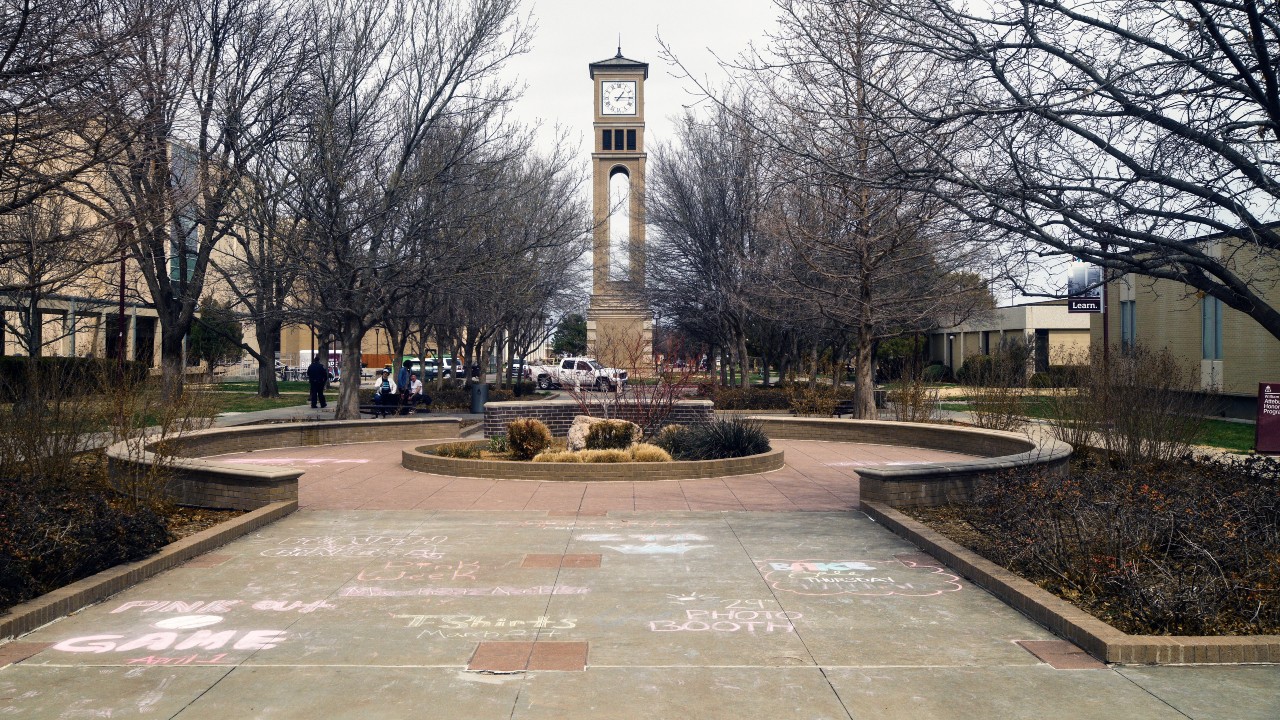
This article originally appeared in The Texas Tribune
 A federal appeals court considering whether West Texas A&M University’s president violated the First Amendment when he canceled a campus drag show last year focused many of their questions Monday on a U.S. Supreme Court ruling that upheld campus non-discrimination policies.
A federal appeals court considering whether West Texas A&M University’s president violated the First Amendment when he canceled a campus drag show last year focused many of their questions Monday on a U.S. Supreme Court ruling that upheld campus non-discrimination policies.
But the panel of three judges used that 2010 case — which said universities can require groups to admit LGBTQ+ students — to suggest that school officials could also ban drag shows because some people find the performances offensive to women.
A lawyer representing a group of West Texas A&M students who’ve twice attempted to host a drag show on campus argued before the 5th U.S. Circuit Court of Appeals Monday that President Walter Wendler discriminated based on viewpoint and censored speech when canceling the performances.
In March 2023, Wendler banned drag shows in response to a student fundraiser that featured drag performers. The president argued the performances “denigrate and demean women,” and shouldn’t be allowed on the public university’s campus.
In September, a federal judge said Wendler acted within his authority to cancel the drag show. In his opinion, U.S. District Judge Matthew Kacsmaryk wrote, at “this point in Free Speech jurisprudence, it is not clearly established that all ‘drag shows’ are categorically ‘expressive conduct.’”
Last month, students with WT Spectrum, the student group at the university, hoped to hold another drag show on campus — to show support for the LGBTQ+ community in a staunchly conservative corner of Texas.
With Wendler’s campus-wide ban still in place, the Supreme Court declined to intervene and the president again ordered the fundraiser from taking place.
The panel of judges hearing the appeal Monday were James Dennis, James Ho and Leslie Southwick.
Many of their questions centered around Christian Legal Society v. Martinez, a case in which the Supreme Court upheld a policy of the University of California, Hastings College of the Law, that bars student groups from excluding members based on status or beliefs.
In 2010, the Supreme Court affirmed that Hastings’ policy does not violate the First Amendment rights of CLS, a group of students that wanted to be officially recognized on campus while not allowing people who engage in “unrepentant homosexual conduct” from joining.
The 5th Circuit judges Monday seemed to suggest that Wendler’s ban was no different from the policy at the center of the 2010 Supreme Court case. One of the judges, who didn’t identify themselves before speaking, asked if plaintiffs intended to use the case in question to overturn CLS.
“Maybe we should overturn CLS?” one of three judges said. “Many people would like CLS overturned.”
Ho equated the policy upheld in CLS with Wendler’s drag ban. He said both intend to make everyone feel included, but the policies have the consequence of targeting one group. In CLS’ case, he said that Christians were singled out on Hastings’ campus for not allowing LGBTQ+ individuals to join. Ho said that previous groups on Hastings’ campus could exclude members, but CLS was singled out by the university’s non-discrimination policy.
JT Morris, senior attorney for the Foundation for Individual Rights and Expression who represented the students, argued that the judges were comparing “apples to oranges” between the two cases.
Morris argued CLS is about a content-neutral policy, while Wendler was clearly discriminating based on viewpoint.
“The First Amendment does not allow the government to use the subjective term ‘offensive’ to restrict speech,” Morris said.
Joseph N. Mazzara, a lawyer with the Texas Attorney General’s Office who represented Wendler, said the students had not suffered any injury as a result of the no-drag policy because there was no future event featuring drag performers planned. Additionally, Mazzara said Wendler’s policy carried no criminal penalties and students could host drag performances off campus.
Mazzara said Wendler’s ban was not a free speech violation, but rather it was akin to banning certain conduct, like skateboarding on the grounds of a monument. He said drag shows constituted conduct, not speech.
“They’re able to do everything they want to do, they’re able to say all the speech they want to [say],” Mazzara said, referring to the student group WT Spectrum. “They just can’t do this one particular thing in this one particular place.”
A judge asked Mazzara how the university would have treated drag shows put on by other student groups, such as a fraternity. The judges seemed to agree with Mazzara that Wendler’s restriction did not target a specific viewpoint.
“If a Christian legal group wanted to have a ‘Drag for Jesus’ event that would also be banned,” Mazzara said.
One judge suggested that some drag shows are offensive to the transgender community, and thus Wendler’s ban would equally protect that population from offensive performances.
Allison Marie Collins, another lawyer from the Attorney General’s Office representing other defendants named in the lawsuit, argued the appellate judges should not impose any restrictions on Texas A&M system Chancellor John Sharp or West Texas A&M Vice President for Student Affairs Christopher Thomas. She argued an injunction against Sharp or Thomas would be overbroad, because it’s clear that only Wendler has acted to stop these shows.
“Neither Chancellor Sharp nor Dr. Thomas have remotely engaged in viewpoint discrimination, exclusion from a public forum or a prior restraint complaint to speech,” Collins said.
In his rebuttal, Morris argued the plaintiffs have standing over Sharp because he has the authority over Wendler to put an end to this restriction on free speech.
“He has the authority to do what’s best for the campus,” Morris said of Sharp. “He should have put an end to this prior restraint, which shouldn’t have lasted a day, and has now lasted a year.”
Disclosure: Texas A&M University and West Texas A&M University have been financial supporters of The Texas Tribune, a nonprofit, nonpartisan news organization that is funded in part by donations from members, foundations and corporate sponsors. Financial supporters play no role in the Tribune’s journalism. Find a complete list of them here.
The Texas Tribune is a nonpartisan, nonprofit media organization that informs Texans — and engages with them – about public policy, politics, government and statewide issues.
Education
Under Katy ISD gender policy, student identities disclosed to parents 19 times since August
Public records obtained by the Houston Landing offer the first glimpse at how often the new, hotly contested policy has been used to disclose LGBTQ+ students’ identities to parents — even if the students aren’t ready.
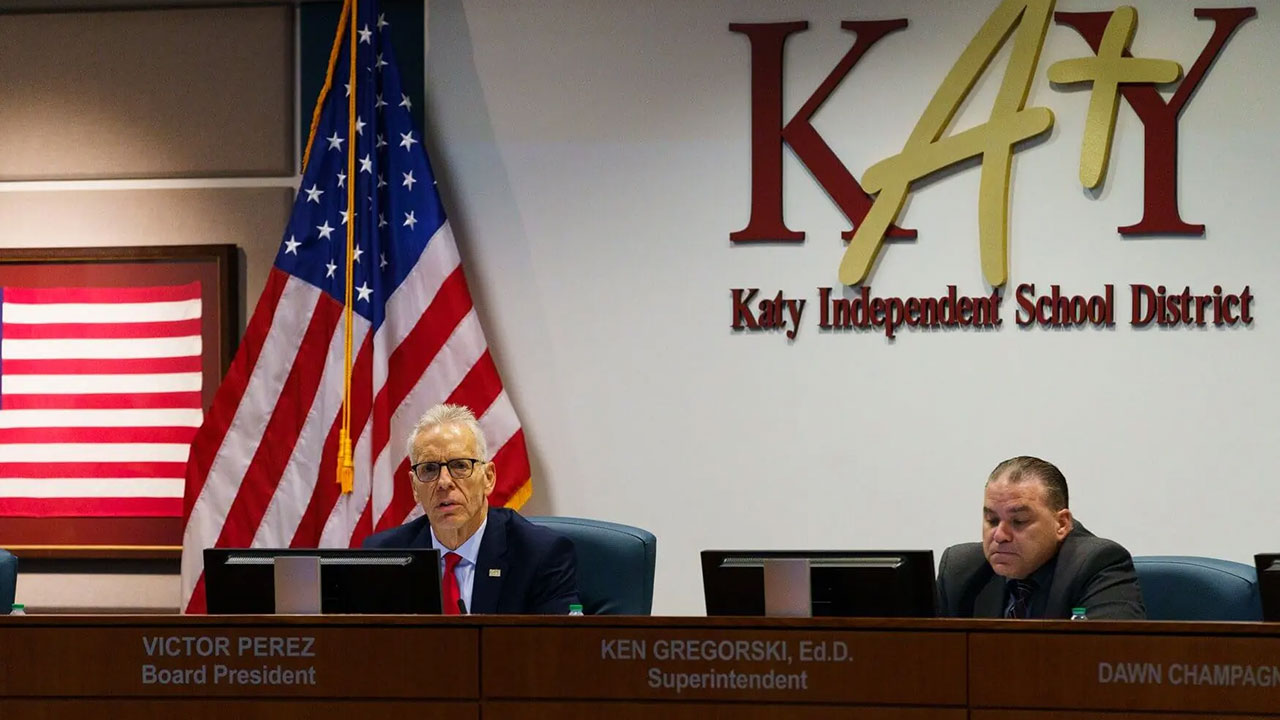
 Since narrowly passing a controversial gender policy two months ago, Katy Independent School District has sent 19 notifications informing parents that their child identified themselves as transgender or requested to use different names or pronouns at school.
Since narrowly passing a controversial gender policy two months ago, Katy Independent School District has sent 19 notifications informing parents that their child identified themselves as transgender or requested to use different names or pronouns at school.
The number of parental notifications, obtained by the Houston Landing through a public records request, is the first glimpse at how often the new, hotly contested policy has been used to disclose LGBTQ+ students’ identities to parents — even if the students aren’t ready.
So far, the district averages a notification to a parent roughly once every three days.
The district’s policy requires staff to inform parents if their student requests to use different pronouns or names, or if they identify themselves as transgender — and obtain written parental consent to comply with the request. It also prohibits employees from asking for students’ preferred pronouns and discussing “gender fluidity,” and requires students to use bathrooms that align with their sex assigned at birth.
Jarred Burton, a student leader at Tompkins High School’s Sexuality and Gender Alliance, said the number of notifications already sent to parents is both depressing and surprising. Critics, including Katy parents, LGBTQ+ students and local advocates, have blasted the policy as a dangerous measure with the potential to expose students’ gender identities to unsupportive parents, further harming a community that already faces a higher risk of mental health issues than their peers.
“It’s just sad to see this actually happening,” Burton said. “It shows that (the policy) is not a bluff.”
Board members who supported the policy hailed it as a measure that would center parents’ right to be informed about their child’s gender identity and protect teachers from making uncomfortable decisions about concealing such information from parents.
“(Parents are) supposed to be looking after the health and welfare of their child,” Board President Victor Perez said at a late August meeting. “Withholding that information from the parent, that is a great burden on staff.”
It’s unclear how many parents were already aware of their child’s gender identity. District officials also did not make any board members available for an interview on the matter.
“The policy is intended to provide parents and guardians the opportunity to be made aware of their child’s name change request, and the opportunity to grant or deny approval of said request,” Katy spokesperson Nick Petito said in a statement Wednesday.

Ash Thornton, a transgender man and a junior at Tompkins High School, said the number of notifications being sent home will discourage LGBTQ+ students from feeling safe to explore their identities.
“It signals that it’s something bad, them being transgender or expressing gender in a way that’s different,” Thornton said. “It definitely messes up student-teacher relationships.”
Employees are not required to comply with a student’s name or pronoun change even if a parent gives consent, the policy states.
One staff member on every campus is responsible for processing and sending notifications to parents and guardians, Petito said. The policy makes an exception for “cases of suspected abuse.”
Students belonging to LGBTQ+ clubs have told the Landing the policy has caused their schools to become less of a safe space and has instilled fear among LGBTQ+ youth in Katy.
“There’s just been this looming cloud of dread over a lot of people,” Burton said in a September interview. “There’s gonna be a lot of people that get in trouble by their parents or get hurt. … It just sometimes keeps me up at night a little bit because it’s hard to imagine how much hate people can have to pass something like this.”
The number of notifications sent to parents to date leaves Thornton to wonder what else is to come.
“It’s only been two months and there’s already 19, how many more people are going to be affected by even just the end of the semester?” he said.
The Houston Landing is a nonprofit newsroom devoted to public service journalism for all Houstonians.
This article first appeared on the Houston Landing and is republished here with permission.





